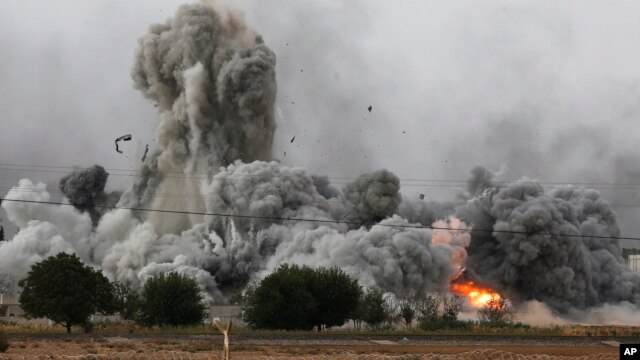Heavy Fighting Reported Sunday in Kobani, Syria
Thick smoke, debris and fire rise following an airstrike by the U.S.-led coalition in Kobani, Syria, as seen from Mursitpinar, on the outskirts of Suruc, at the Turkey-Syria border, Oct. 12, 2014.
Last updated on: October 12, 2014 11:37 AM
Heavy fighting has been reported for yet another day in and around the Syrian city of Kobani along the Turkish border.
Dark plumes of smoke could be seen rising above the city Sunday as Kurdish fighters battled to defend the city from the continuing onslaught by Islamic State extremists.
U.S.-led coalition warplanes have been pounding targets in and around Kobani.
Turkish troops remain disengaged just across the border, despite increasingly vocal international pressure on Turkish President Recep Tayyip Erdogan to intervene.
Massacre warning
U.N. officials in the region have warned that as many as 12,000 Kurds, including hundreds of elderly people in the city's center, "will most likely be massacred" if Kobani falls.
The British-based Syrian Observatory for Human Rights says Islamic State extremists controlled 40 percent of the town by early Saturday.
The Turkish government has so far refused to join the battle, citing ties between Kobani's Kurdish defenders and the outlawed Kurdistan Workers Party.
The PKK has waged a decades-long rebellion for self-rule in southeastern Turkey and has been designated a terrorist organization by Ankara and Washington.
Meanwhile, the U.S. Central Command said on Sunday that U.S. and other members of the international coalition conducted four airstrikes against Islamic State terrorists in Syria on Saturday and Sunday.
Separately, coalition forces conducted five airstrikes against the Islamic State group in Iraq, using attack and remotely piloted aircraft.
Airstrikes in Syria were conducted by the U.S. as well as Saudi Arabia and the United Arab Emirates forces. In Iraq, the U.S. and United Kingdom conducted the airstrikes.
Making progress in talks
Addressing Turkey's reluctance to help Syrian Kurd fighters, U.S. Defense Secretary Chuck Hagel said Saturday that Washington is making "considerable progress" in talks with Ankara on plans to train moderate Syrian fighters.
Hagel, speaking in the Chilean capital, said U.S. talks in the coming days with Turkish military officials will focus on specifics of Turkey's training commitments.
Hagel added that the situation in Kobani is difficult and complicated. But he said Iraqi security forces are in full control of Baghdad and continue to strengthen their positions there.
The U.S.-led alliance has been carrying out airstrikes on Islamic State targets in Kobani, but there were widespread reports Saturday that those strikes were hampered by sandstorms.
On Friday, U.S. officials - stressing the need for ground troops - acknowledged those airstrikes have not stopped the onslaught.
Hold Iraq, Syria ground
Islamic State fighters also control large swaths of nearby northern and western Iraq, where a local council leader (Sabah Al-Karhout) told CNN the situation is "very bad."
He said the council has intelligence that the Islamic State group has sent at as many as 10,000 reinforcements to the outskirts of Baghdad from Syria and from the Iraqi city of Mosul in the north. VOA



No comments:
Post a Comment